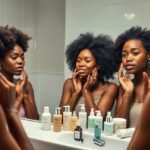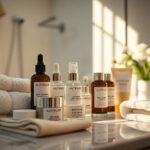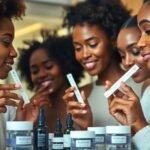
There’s a common challenge many of us face when it comes to #skincare. As an African American woman, your skin has unique needs that deserve specific attention. I’ve learned through experience that implementing a simple yet effective skincare routine can make all the difference. In this post, I’ll share powerful insights on how to achieve glowing skin while avoiding products that may not suit our skin type. Together, let’s explore ways to enhance your beauty effortlessly!
Key Takeaways:
- Focus on hydration: Use moisturizers that contain ingredients like shea butter, glycerin, and hyaluronic acid to keep skin hydrated and plump.
- Prioritize sunscreen: Apply a broad-spectrum sunscreen daily to protect against UV rays, which can cause hyperpigmentation.
- Incorporate gentle exfoliation: Use exfoliants a few times a week to remove dead skin cells, enhancing skin texture and brightness.
- Select the right cleanser: Opt for a mild cleanser that does not strip the skin of its natural oils, helping to maintain a healthy barrier.
- Embrace natural oils: Incorporate oils like jojoba, argan, or marula oil to nourish and balance the skin without clogging pores.
- Address specific concerns: Target issues such as dark spots or uneven skin tone with serums that contain vitamin C, niacinamide, or retinol.
- Maintain consistency: A regular skincare routine tailored to individual needs is key for achieving and maintaining healthy skin.
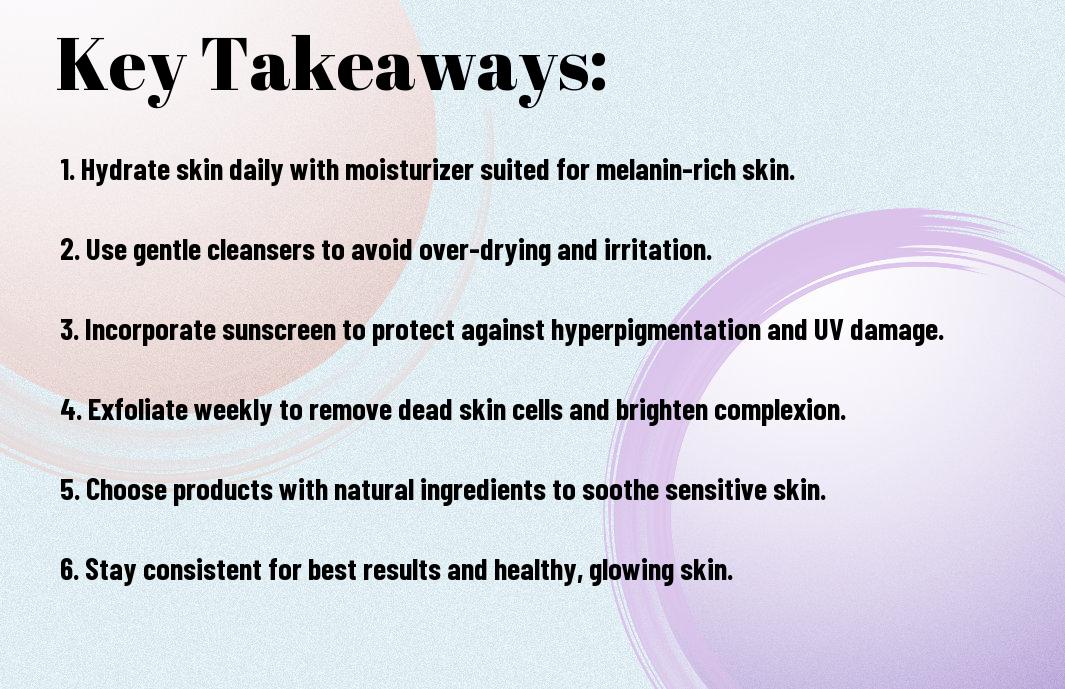
Unpacking Unique Skin Needs
Understanding the distinct needs of African American skin is necessary for creating effective skincare routines. Your skin often experiences specific challenges that can be influenced by genetics, environmental factors, and lifestyle choices. For instance, the naturally occurring melanin in your skin not only provides protection but can also lead to unique concerns such as hyperpigmentation and uneven skin tone. In this section, I’ll explore into key factors affecting your skin and how you can tailor your regimen accordingly.
The Role of Melanin in Skin Health
Melanin, the pigment responsible for skin color, plays a significant role in skin health and protective qualities. Higher melanin levels offer some degree of natural UV protection, reducing the risk of sun damage. However, this same melanin can lead to challenges such as hyperpigmentation—dark spots that may become more pronounced with sun exposure or skin trauma. Recognizing how melanin affects your skin can help you create a targeted skincare routine.
Common Skin Concerns Among African American Women
Many African American women face similar skin issues, including acne scarring, dryness, and hyperpigmentation. These challenges arise not only from natural skin characteristics but also from external factors such as climate, diet, and product choices. Understanding these common concerns equips you to better address them in your skincare regimen.
When considering common skin concerns, it’s evident that issues like hyperpigmentation often manifest after injuries, acne breakouts, or even excessive sun exposure. Because your skin tends to have a higher likelihood of developing dark spots, you may require specialized products containing ingredients like vitamin C or niacinamide to promote an even skin tone. Additionally, dry skin may become pronounced with seasonal changes, highlighting the importance of rich moisturizers and hydrating serums in your daily routine. By identifying and addressing these specific issues, you can cultivate a skincare routine that caters to your unique skin needs effectively.
The Power of Natural Ingredients
Integrating natural ingredients into your skincare routine can yield remarkable benefits, especially for African American women who may face unique skin challenges. Ingredients derived from nature, such as shea butter and coconut oil, not only provide hydration but also contribute to skin health and radiance. They offer a gentler alternative to synthetic products, often devoid of harmful chemicals, making them ideal for sensitive skin types. By embracing these natural options, I’ve found my skincare routine not only becomes more effective but also enhances my overall well-being.
Benefits of Shea Butter and Coconut Oil
Shea butter is rich in fatty acids and vitamins, making it a powerful moisturizer that helps combat dryness and improves skin elasticity. Coconut oil, known for its antibacterial properties, further supports hydration while reducing inflammation. Using these natural ingredients together can strengthen your skin barrier, promoting a healthy complexion. Both shea butter and coconut oil also assist in soothing irritated skin and reducing the appearance of scars.
The Importance of Antioxidants and Vitamins
Antioxidants and vitamins play a vital role in maintaining skin health and fighting premature aging. Ingredients packed with vitamins A, C, and E protect your skin from environmental stressors, helping to rejuvenate and brighten your complexion. Foods like berries, dark leafy greens, and nuts boost the skin’s resilience, while topical applications can provide immediate benefits. Moisturizers enriched with vitamins can significantly improve texture and tone, leaving you with vibrant skin that exudes health.
When you prioritize antioxidants and vitamins in your skincare routine, you’re actively promoting cellular repair and regeneration. Vitamin C helps brighten your skin while fading hyperpigmentation often seen in darker skin tones. Vitamin E works to shield your skin against free radicals, while Vitamin A helps improve skin texture and reduces the appearance of fine lines. Collectively, these nutrients ensure your skin remains healthy, youthful, and radiant, fighting off effects from stress, pollution, and sun exposure.
Building Your Daily Skincare Routine
Crafting a daily skincare routine tailored to your unique skin type is crucial for maintaining its health and vitality. Incorporating a structured approach can make a noticeable difference in your skin’s appearance and texture. I find it best to allocate time each morning and evening for my routine, allowing me to consistently care for my skin and address any specific concerns effectively.
Essential Steps: Cleanse, Exfoliate, Moisturize, Protect
Focusing on four key steps forms the backbone of any effective skincare routine. I start by cleansing to remove impurities, followed by gentle exfoliation a few times a week to slough off dead skin cells. Moisturization keeps my skin hydrated and plump, while daily application of SPF protects against harmful UV rays. Each step serves to enhance the overall health of my skin.
Evening vs. Morning Routines: Key Differences
Morning and evening skincare routines serve different purposes, and it’s vital to understand these distinctions. The morning routine focuses primarily on protection and hydration, preparing your skin to face the day. In contrast, the evening routine prioritizes repair and rejuvenation, allowing your skin to recover from daily stressors, pollution, and makeup buildup.
During the day, I prioritize lightweight, breathable products that shield my skin from environmental stressors. In the evening, however, I switch to richer formulations filled with active ingredients designed to work overnight. This might include serums with retinol for anti-aging or hyaluronic acid for deep hydration. Customized adjustments emphasize the skin’s recovery while maximizing its protective barriers, ensuring I wake up to a fresh, revitalized complexion.
Tailoring Products for Optimal Results
Selecting the right products is important for harnessing the full potential of your skincare routine. Given the unique characteristics of African American skin, I recommend focusing on ingredients that specifically target your needs. This may include sheer butter for hydration and niacinamide for reducing hyperpigmentation. Products should be non-comedogenic and free of harsh chemicals, ensuring they support rather than compromise your skin’s health.
Navigating Product Labels for Skin Type
Decoding product labels can feel overwhelming, but it’s vital to select formulations suited to your skin type. Look for terms like “oil-free” if your skin is oily or “hydrating” if you experience dryness. Ingredients like salicylic acid are great for acne-prone skin, while hyaluronic acid is perfect for adding moisture. Pay attention to the order of ingredients; the higher up a component appears, the more of it is present.
Customizing Ingredients Based on Seasonal Changes
Adapting your skincare ingredients with the changing seasons can significantly enhance your skin’s health. During the colder months, I incorporate more emollients and occlusives to combat moisture loss, while in the summer, lighter formulations with ingredients like gel-based moisturizers are preferable. This seasonal shift helps maintain balance and keeps your skin glowing all year round.
As temperatures drop, your skin may crave additional moisture to counteract the drying effects of cold air. You might find that oils rich in omega fatty acids, like jojoba oil, work wonders in keeping your skin hydrated. In warmer weather, consider switching to lighter serums to prevent greasiness while still providing necessary hydration. Being attuned to these shifts allows your skincare routine to adapt, ensuring that your skin remains vibrant and healthy season after season.
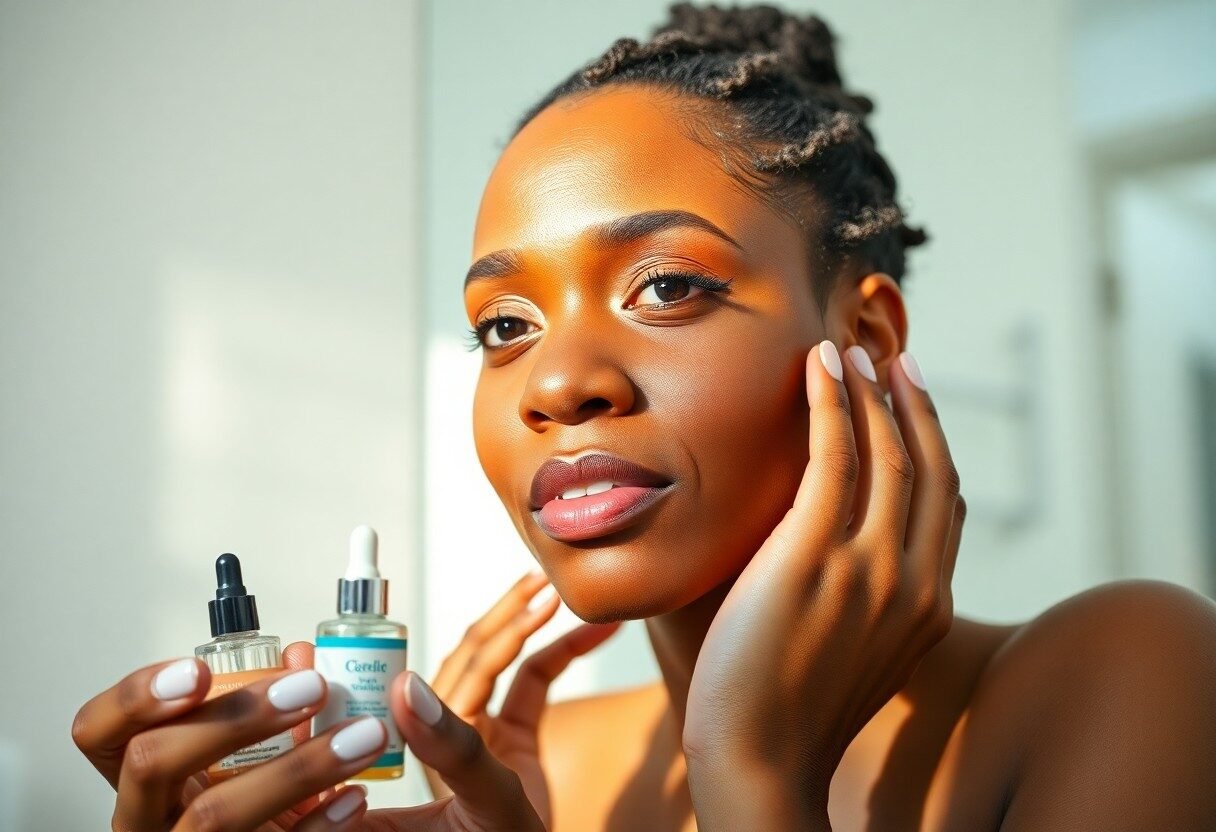
Expert Tips for Long-term Skincare Success
Achieving long-term skincare success hinges on consistency and adaptability in your routine. Here are important tips to help you maintain healthy skin throughout the years:
- Maintain a strong focus on hydration through adequate water intake.
- Regularly assess your skin type and adjust products accordingly.
- Incorporate sunscreen daily to prevent premature aging.
- Stay informed about ingredient changes and emerging skincare innovations.
This straightforward yet powerful approach enables you to cultivate resilient, glowing skin.
Incorporating Professional Treatments
Integrating professional treatments into your skincare regimen can intensify results. Monthly facials tailored to your specific skin needs, such as microdermabrasion or chemical peels, help address issues like hyperpigmentation and uneven texture. Consult with an experienced dermatologist who understands African American skin to create a personalized treatment plan. This ensures that you’re maximizing the potential of both your professional and at-home skincare efforts.
Lifestyle Factors that Impact Skin Health
Your lifestyle plays a pivotal role in the health of your skin. Factors such as nutrition, sleep quality, and stress levels directly affect your skin’s appearance. Consuming a balanced diet rich in antioxidants and healthy fats supports skin vitality, while restful sleep promotes repair. Managing stress through regular exercise and mindfulness contributes to a more radiant complexion. This holistic approach is important for sustained skin health.
To dive deeper into lifestyle influences, focus on maintaining a balanced diet and effective stress management. Incorporate foods high in vitamins A, C, E, and omega-3 fatty acids for nourishing skin. Hydration also impacts elasticity and texture, so make water a staple. Additionally, managing emotional health through practices like yoga or meditation can prevent stress-induced breakouts and promote a clear complexion. This comprehensive strategy leads to effective skin health management.
- Prioritize a balanced diet with plenty of fruits and vegetables.
- Commit to sufficient sleep each night for skin regeneration.
- Engage in regular exercise to improve circulation.
- Practice stress-relief techniques like yoga or meditation.
This proactive approach carries a profound impact on your skin’s long-term vitality.
Final Words
Considering all points, I believe that adopting a simple and effective skincare routine is imperative for African American women. Your skin deserves the best care tailored to its unique needs, which often include hydration and protection from hyperpigmentation. By focusing on quality products that suit your skin type and following a consistent routine, you can achieve a radiant complexion. It’s about finding what works for you and embracing your beauty with confidence. Ultimately, investing time in your skincare is an investment in yourself.
FAQ
Q: What are the crucial steps in a basic skincare routine for African American women?
A: A basic skincare routine should typically include the following steps: cleansing, toning, moisturizing, and applying sunscreen during the day. Cleansing helps to remove dirt and impurities, toning balances the skin’s pH, moisturizing hydrates the skin, and sunscreen protects against harmful UV rays. It’s important to choose products that cater specifically to your skin type, whether it’s oily, dry, or combination.
Q: How can I determine my skin type?
A: To determine your skin type, start by cleansing your face and waiting for about an hour without applying any products. Observe how your skin feels: oily skin may appear shiny and feels greasy, dry skin may feel tight and flaky, combination skin will be oily in some areas and dry in others, while normal skin maintains a balanced feel. If you’re still unsure, consider visiting a dermatologist for a professional assessment.
Q: What ingredients should African American women look for in skincare products?
A: Ingredients beneficial for African American women often include hyaluronic acid for hydration, shea butter for moisture, vitamin C for brightening, and niacinamide for reducing dark spots and enhancing skin texture. Additionally, look for products with natural oils like jojoba or argan oil, which provide nourishment and elasticity to the skin.
Q: How often should I exfoliate my skin?
A: Exfoliation should typically occur about 1 to 3 times a week, depending on your skin type. For sensitive skin, once a week may be sufficient, while those with oily skin can benefit from exfoliating up to three times. It’s crucial to listen to your skin and adjust the frequency if you notice irritation or excessive dryness.
Q: What should I consider when choosing sunscreen?
A: When choosing sunscreen, look for products labeled as ‘broad-spectrum’ to protect against both UVA and UVB rays. Opt for a sunscreen with an SPF of at least 30, and consider formulations with moisturizing ingredients to keep your skin hydrated. For darker skin tones, mineral-based sunscreens with zinc oxide or titanium dioxide often work better and blend into the skin without a white cast.
Q: How can I address hyperpigmentation in my skincare routine?
A: To address hyperpigmentation, incorporate products containing alpha hydroxy acids (AHAs) or beta hydroxy acids (BHAs) for gentle exfoliation, alongside serums with ingredients like vitamin C, licorice root extract, or azelaic acid that help brighten the skin. Consistency is key, and always follow up with sunscreen to prevent further darkening of spots during the day.
Q: Are there specific lifestyle tips that can enhance my skincare routine?
A: Yes, several lifestyle factors can improve your skincare results. Staying hydrated helps maintain skin elasticity and moisture. A balanced diet rich in antioxidants (fruits and vegetables) can promote healthier skin. Additionally, getting adequate sleep and managing stress levels can help improve skin health. Regular exercise can also enhance circulation and promote a radiant complexion.
